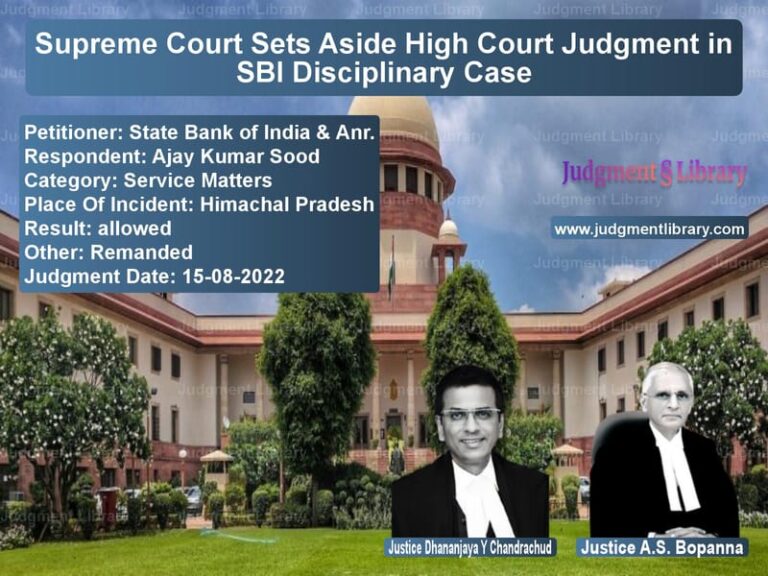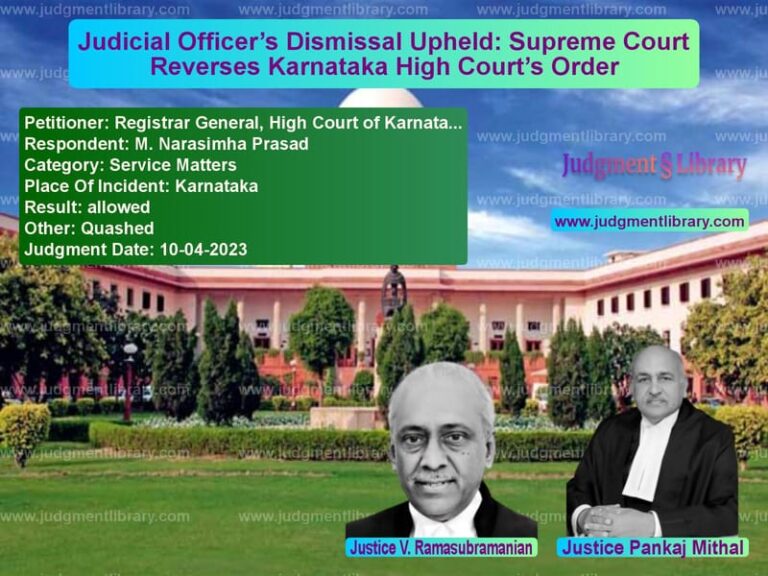Customs Valuation and Classification: Supreme Court Dismisses Appeal by Indusind Media & Communications Ltd.
The case of Indusind Media & Communications Ltd. v. Commissioner of Customs, New Delhi revolved around the classification and valuation of imported goods under the Customs Act, 1962. The Supreme Court had to determine whether the customs authorities correctly classified and valued the imported goods, rejecting the appellant’s declaration and imposing additional duties and penalties.
The Court ultimately upheld the decision of the Customs, Excise, and Service Tax Appellate Tribunal (CESTAT) and dismissed the appeal, affirming that the classification and valuation made by the customs authorities were justified.
Background and Key Issues
The dispute arose when Indusind Media & Communications Ltd. imported equipment for cable TV operations and filed a Bill of Entry at the Air Cargo Complex, New Delhi, declaring them as separate items under different classifications. The customs authorities, however, found that the items collectively constituted a complete ‘Head End’ system for cable TV operations and reclassified them under Customs Tariff Heading (CTH) 8543 8999.
The key legal issues before the Supreme Court were:
- Whether the imported items should be classified separately or collectively as a ‘Head End’ system under CTH 8543.
- Whether the customs authorities were justified in rejecting the declared invoice value and reassessing it under Rule 9(1)(e) of the Customs Valuation (Determination of Price of Imported Goods) Rules, 1988.
- Whether the additional demand of customs duty, confiscation of goods, and imposition of penalties were legally valid.
Arguments of the Petitioner (Indusind Media & Communications Ltd.)
- The company declared each imported item separately under different tariff headings (Chapter 84/85), and customs authorities should not have clubbed them together.
- The imported goods did not form a complete ‘Head End’ system, as some essential components were procured separately.
- The authorities incorrectly added software and service charges to the value of the goods, leading to an artificial increase in the assessable value.
- There was no misdeclaration or undervaluation, as alleged by the customs authorities.
Arguments of the Respondent (Commissioner of Customs, New Delhi)
- Investigations revealed that the imported items were meant to function together as a ‘Head End’ system for cable TV operations and should be classified accordingly.
- The company deliberately split the value of goods to evade customs duty by showing a lower invoice value.
- The purchase order indicated that the software was embedded in the hardware before importation, and charges for pre-import services were correctly included in the assessable value.
- The declaration by the importer was misleading, justifying the reassessment of value and the imposition of penalties.
Supreme Court’s Key Observations
1. Classification of Imported Goods
“The goods were imported as a complete ‘Head End’ system, and individual classification of items amounted to misdeclaration. Note 4 to Section XVI of the Customs Tariff supports the classification under a single heading when components contribute to a clearly defined function.”
The Court upheld the customs authorities’ decision to classify the imported goods under CTH 8543 instead of individual classifications under different headings.
2. Customs Valuation and Addition of Software Costs
“Since the software was embedded in the imported goods before shipment, its value was correctly added to the transaction value under Rule 9(1)(e) of the Customs Valuation Rules.”
The Court ruled that the reassessment of value was justified as the importer had not declared the full cost of the imported system, including pre-import services and embedded software.
3. Misdeclaration and Confiscation of Goods
“The importer deliberately misdeclared the value of imported consignments by splitting invoices and suppressing the value of embedded software. The goods were rightly confiscated under Section 111(m) of the Customs Act.”
The Supreme Court found that the importer had fabricated documents to show a lower invoice value and evade customs duty, warranting confiscation and penalties.
Final Judgment
The Supreme Court dismissed the appeal and ruled that:
- The imported goods were correctly classified under CTH 8543 8999.
- The reassessment of the invoice value, including software and service charges, was justified.
- The confiscation of goods under Section 111(m) of the Customs Act was legally valid.
- Penalties imposed under Sections 112(a) and 114AA of the Customs Act were upheld.
Impact of the Judgment
- Reinforces Customs Authorities’ Powers: Confirms that authorities can reclassify goods and reassess value if they detect misdeclaration or undervaluation.
- Clarifies Customs Valuation Rules: Establishes that software embedded before importation must be included in the assessable value.
- Discourages Misdeclaration: Serves as a deterrent against importers attempting to evade duties by splitting invoices or underreporting values.
- Strengthens Enforcement of Tariff Classifications: Emphasizes that when imported components contribute to a clearly defined function, they should be classified under a single heading.
The Supreme Court’s decision ensures that importers cannot evade customs duties through artificial invoice splitting and strengthens the legal framework for customs valuation and classification.
Petitioner Name: Indusind Media & Communications Ltd..Respondent Name: Commissioner of Customs, New Delhi.Judgment By: Justice Uday Umesh Lalit, Justice Vineet Saran.Place Of Incident: New Delhi.Judgment Date: 27-09-2019.
Don’t miss out on the full details! Download the complete judgment in PDF format below and gain valuable insights instantly!
Download Judgment: Indusind Media & Com vs Commissioner of Cust Supreme Court of India Judgment Dated 27-09-2019.pdf
Direct Downlaod Judgment: Direct downlaod this Judgment
See all petitions in Customs and Excise
See all petitions in Tax Evasion Cases
See all petitions in Judgment by Uday Umesh Lalit
See all petitions in Judgment by Vineet Saran
See all petitions in dismissed
See all petitions in supreme court of India judgments September 2019
See all petitions in 2019 judgments
See all posts in Taxation and Financial Cases Category
See all allowed petitions in Taxation and Financial Cases Category
See all Dismissed petitions in Taxation and Financial Cases Category
See all partially allowed petitions in Taxation and Financial Cases Category







